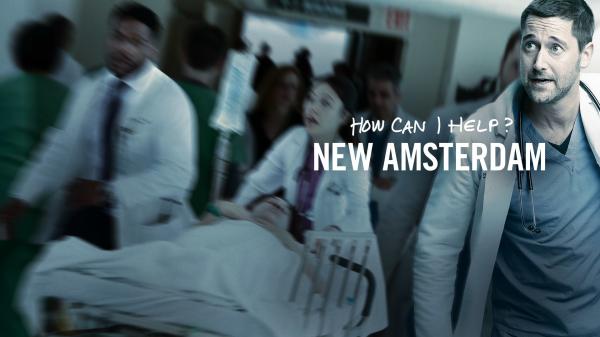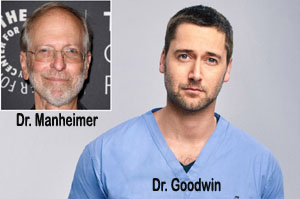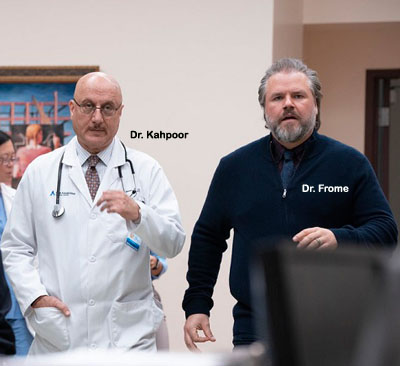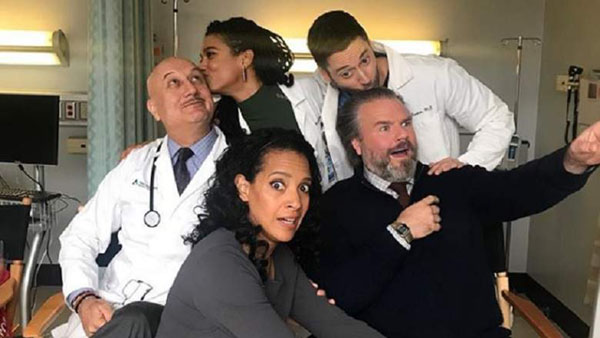New Amsterdam: Best Medicine for Counselors

Key: TV shows which resonate with us can ease our stress by normalizing our struggles, strengthening our perseverance and teaching us about ourselves and our world.
Living it: In this case, counselors and medical professionals, watch New Amsterdam.
Clinical Concept: Professional Cinema therapy as an educational, normative and resilience-building tool.
“What sets our show apart from all the others out there, we are the only medical drama on television out there based on a true story.”
– Jocko Sims, Actor
Dr. Floyd Reynolds, New Amsterdam
I’m going to be upfront about this. Despite what some critics say, or how NBC’s New Amsterdam has received at best lukewarm ratings throughout its first season, I love it. I love it as a member of the mental health field and the larger world of managed medical care. To offer some further context, I watched both ERs as a kid and now share medical dramas with my wife. The last one we watched to completion was House. We watched over six seasons of Grey’s Anatomy but eventually got McBoredy as it drifted more toward drama and further from medical. Thus, it’s interesting that I’m repeatedly touched by New Amsterdam which “follows conventional hospital series structure with two major medical stories per episode” that are driven, and sometimes overshadowed, by the dramatic themes inherent in the memoir of Dr. Eric Manheimer that the television show is based around. Dr. Manheimer was the medical director of Bellevue Hospital for 15 years and he wrote Twelve Patients: Life and Death at Bellevue Hospital to showcase the challenge of individualized care in a corporate system, struggles for innovation amid in a rigid healthcare climate and most of all, the diverse stories of the patients which are larger than their illnesses.

“It’s not a ‘Sherlock Holmes’ about a tricky case [or a] doctor with a psychiatric illness who is able to pull rabbits out of a hat,” Manheimer told MedPage Today. “It’s about dealing with complicated social situations and taking care of people in that environment.” That includes Dr. Manheimer who reveals in his memoir is that he is of the twelve patients at Bellevue Hospital. Dr. Manheimer lived the health system as a doctor, director and cancer patient. And he took notes. “I still do it to this day,” he said. “I was very interested in the patients that came there and their stories — why they were in the hospital and what was driving it. I ended up with 150 notebooks when I sat down to write a book in 2011” (2018).
Dr. Manheimer’s three-fold view of the health system is the skeleton of New Amsterdam. The body of the show is the true stories in those 150 notebooks—breathed some Hollywood life in the writer’s room—and portrayed in a way that shows us ourselves in the lives of others. But the heart, the heart is what keeps me coming back as a fan and a counselor. It is the belief that everything can be improved. Quality of life, the healthcare system, our relationships, ourselves. Though it is a TV drama, it is also honest, because that hope is also portrayed against the reality that there is pain in the improving and success is never guaranteed. These themes, delivered in a highly enjoyable prime-time TV show, are a great way to decompress while also feeling understood, inspired and rejuvenated as medical and mental health professionals.
Episodes by Prescription
“Life doesn’t always present an easy answer, and hopefully that’s what the show is trying to explore.”
-Ryan Eggold, Actor
Dr. Max Goodwin, New Amsterdam
Acclaimed actor Ryan Eggold brings Dr. Manheimer’s story to life as Dr. Max Goodwin, an endearingly driven, free-thinking medical director who is also trying (unsuccessfully) to come to grips with a new cancer diagnosis and strained marriage. “Manheimer says that he, too, was ‘pretty radical’ when he joined Bellevue,” the NY Post reported. “I knew the system very well…NYU Bellevue had their own culture. I knew I would take a beating.”

Max takes a beating as well, and that’s one of the things I relate to as a counselor who spent nearly a decade working in a mental health hospital always seeking to innovate for better client care. Systems are very rigid and do keep the majority safe. New Amsterdam teaches subtle lessons about individualized care, including the patient’s right to choose the treatment they have. This was depicted well in the episode “Happy Place” when Dr. Iggy Frome, head of the psychiatric ward, works with a deaf patient who received a cochlear implant. Not only is this a good episode on patient dignity, it has a wonderful Mindfulness undercurrent as well.

Speaking of Dr. Frome and the psychiatric department, that alone is a reason to love this show. As a strong advocate that mental health should be as destigmatized and on equal footing with physical health, seeing recurring mental health plotlines is refreshing and true to Bellevue Hospital. “We had a 450-bed psychiatric unit, including kids,” Dr. Manheimer told the NY Post. He then went one step further, “we used to go to Rikers Island once a month to coordinate care for prisoners,” he said. “These are the sickest people in New York City,” and New Amsterdam goes there, too, such as the episode “Every Last Minute” which touches on patient dignity and attachment theory with an inmate giving birth and not wanting her baby to go directly into foster care.
The mental health and medical themes we, as counselors, can relate to are peppered all throughout season one. Check out “Three Dots” for a focus on mental health stigma in other cultures. “Rituals” and “The Blues” are wonderful examples of patient-centered care from the janitorial staff up, team engagement and shaking up routine to avoid burnout and increase productivity in programs that are chronically under-staffed and over-stressed. There are positive psychology messages from Dr. Frome and hey, want Ecotherapy? I sure do! Check out “Boundaries” and how the whole hospital comes together to finish the patient care garden—they even cite data.

But it’s not all pretty pictures. “This is Not the End” is the second part of an arc involving a review of unethical care against Dr. Frome that examines how counselors can become too entangled in their desire to help—especially when too close to a case—and potentially infringe on patient boundaries. Most of all, Dr. Max Goodwin is a (barely) walking object lesson on self-care. “I can do this in my own life, as I think we all can,” Ryan Eggold told Collider, “when you are so caught up with work and worrying about a million things, the last thing you have time to worry about is yourself. Max…has a genuine care for the people, and he genuinely wants to help…every day, there’s a list of things, and you can’t get to everything…that overwhelming quality is part of what makes the show so compelling” (2019). Counselors push themselves too far for all the right reasons. As a viewer I cringed at some of the ways Max kept helping when he needed to help himself and then I realized that I may be looking in a dramatized mirror.
Please keep in mind this is entertainment. Though I love these themes, I fear I may be over-stressing them. Viewers are not hit over the head with moral or financial lessons, they are inspired, enthralled and carried on a well written, superbly acted, culturally diverse, emotionally rich hour of television. I would prescribe it, if I could, as a way to de-stress, enjoy time with your spouse and reinvigorate yourself to get back into the office and build a better world.

Frieden, J. (2018) A Doctor’s Life at the Nation’s Oldest Hospital, Now on TV. Medpage Today. Retrieved from: https://www.medpagetoday.com/hospitalbasedmedicine/generalhospitalpractice/75311
Radish, C. (2019) Ryan Eggold on the Success of ‘New Amsterdam’, Finding Ways to Improve the Show, and ‘BlacKkKlansman.’ Collider. Retrieved from: http://collider.com/ryan-eggold-new-amsterdam-interview/
Rorke, R. (2018) Meet the real-life doctor who inspired ‘New Amsterdam.’ NY Post. Retrieved from: https://nypost.com/2018/10/08/meet-the-real-life-doctor-who-inspired-new-amsterdam/

 Previous Post
Previous Post Next Post
Next Post